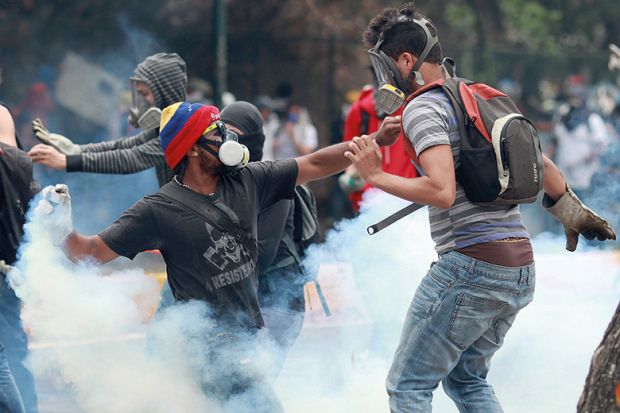Scholars and students around the world face a “continuing global crisis of attacks” driven by an “anti-democratic fear of universities” as bastions of free thought, according to an international network that promotes academic freedom.
Figures released today by Scholars at Risk reveal that global higher education was subject to 257 reported attacks in 35 countries between 1 September 2016 and 31 August 2017, including 55 cases involving killings, violence and disappearances.
A further 83 incidents led to academics or students being imprisoned, while 45 led to prosecution, according to data published in the organisation’s 2017 Free to Think report.
The overall figure represents an increase on last year, when 158 attacks in 35 countries were chronicled between May 2015 and September 2016.
Robert Quinn, executive director of Scholars at Risk, said: “Over the past year, we have witnessed a continuing global crisis of attacks on higher education communities as documented in our previous reports. What has become increasingly clear this year is an anti-democratic fear of universities as spaces in which everyone is free to think, question and share ideas.”
He added that the report “highlights the toll of these attacks on individual lives and serves as a clarion call to meaningful action for states and civil society to ensure the security, well-being, and sustainable future of the university space”.
The report states that at least 46 students, scholars, university staff and other individuals were killed over the past year as a result of violent attacks on higher education, with hundreds more injured.
These included the 24 October assault on Balochistan Police College in Pakistan that killed at least 61 people, primarily students, and a string of six attacks on the University of Maiduguri in Nigeria, starting on 16 January, that resulted in at least 14 fatalities.
The report also counts 32 cases that have led to academics losing their positions and a further 21 that have involved travel restrictions.
It highlights the academic purge in Turkey, which in the past year has resulted in 7,023 academics and administrators being targeted for dismissal from their positions, 294 students being expelled, and at least 990 scholars, staff and students being detained or arrested.
Mass arrests of student protesters in Venezuela, with reports of widespread custodial abuse and detention without charge, are also major concerns.
Overall there were 63 incidents involving organised student expression, including protests, marches, and press conferences, 45 of which involved attacks on students, as occurred during a Fees Must Fall meeting at the University of the Witwatersrand in South Africa last autumn, and 18 of which involved violent or destructive acts committed by the students themselves, such as the protest against Milo Yiannopoulos’s speech at the University of California, Berkeley.
Meanwhile, legislative amendments threatening the existence of Hungary’s Central European University and the revocation of the European University at St Petersburg’s licence are further concerns representing “serious threats to academic freedom and institutional autonomy”, according to the report.
Register to continue
Why register?
- Registration is free and only takes a moment
- Once registered, you can read 3 articles a month
- Sign up for our newsletter
Subscribe
Or subscribe for unlimited access to:
- Unlimited access to news, views, insights & reviews
- Digital editions
- Digital access to THE’s university and college rankings analysis
Already registered or a current subscriber? Login








